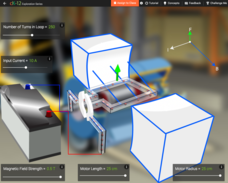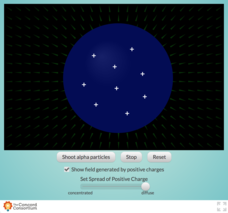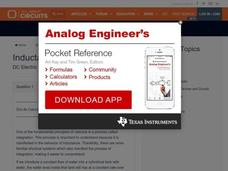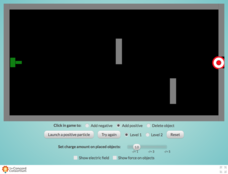CK-12 Foundation
Electric Motor
How does a direct current run a motor? Pupils control five variables in an electric motor and observe how the force diagram changes. The force, magnetic field, and current vary based on the changes in the design of the magnet and...
PHET
Generator
Michael Faraday was self-educated, earned an honorary doctorate from the University of Oxford, invented the first Bunsen burner, discovered the laws of electrolysis, and proved that a changing magnetic field produces a current. In this...
Concord Consortium
Concentrating Charge and Electric Fields
How did Rutherford determine that the nucleus was the center of an atom? Take a look inside the famous Gold Foil Experiment with an interesting interactive. Learners fire a beam of alpha particles at a nucleus containing variable...
Concord Consortium
Conversion of Electric Potential Energy
Here is a resource that is full of potential energy! Learners manipulate charged objects to convert electric potential to thermal energy using a savvy simulation. The resource includes a variety of charge settings and helpful potential...
Curated OER
Inductance
In this inductance worksheet, learners answer 20 questions about magnetic fields as they relate to inductors, inertia, transistors, and the flow of current through circuits.
PHET
Faraday's Electromagnetic Lab
"But still try, for who knows what is possible." - Michael Faraday. Faraday's advice features in a simulation that permits pupils to play with a bar magnet in order to make a light bulb glow connecting electromagnetic induction to...
PHET
Faraday's Law
Could a flux capacitor really work? An engaging simulation encourages scholars to investigate Faraday's law. They experiment with various speeds, magnitude, voltage, and different-sized coils. Hopefully experimenters will be able to...
Concord Consortium
Visualizing Electric Fields and Forces
Shock your class with an exciting interactive about electric fields! Physical science superstars visualize the transparent world of electric fields by changing the charge on a stationary object. They then observe changes in the resulting...
PHET
Electric Field of Dreams
What is the largest electric field in the world? The world itself! This explains why you use a magnetic compass to determine direction. During the simulation, scholars add charges to their electric field to see how the field reacts....
Concord Consortium
Charge Intensity and Electric Force
Looking for a quick way to supercharge your electricity and magnetism unit? Assign a very responsive interactive designed to illustrate the relationship between charge, electric field, and the resulting forces. Learners experiment with...
CK-12 Foundation
Doorbell
What are some simple uses for an electromagnet? Scholars explore the electromagnetic circuitry in a doorbell through an interesting simulation. They control the core material, number of loops, amount of current, and strength in a spring....
Curated OER
Magnetism
In this magnetism worksheet, learners answer ten questions about magnets, their magnetic poles, the magnetic lines of flux and how magnets work.
Concord Consortium
Direction and Strength of Force in Electric Fields
Finally, a helpful tool for modeling electric fields! Young physicists explore the unseen world of magnetism via a simple interactive. Individuals move a charged object around a stationary object and see the strength and directions of...
Curated OER
Basic Electromagnetism and Electromagnetic Induction
In this electromagnetism and electromagnetic induction activity, students answer 12 questions about electricity, about the magnetic fields in given diagrams, about the right-hand rule and about electric current and voltage in magnetic...
CK-12 Foundation
Galvanometer
In 1820, Hans Christian Orstead discovered the link between electricity and magnetism, which allows us to measure current and voltage. The simulation allows scholars to observe the inner workings of an ammeter and voltmeter as they...
Concord Consortium
Target Game—Free Play
Challenge your classes to use electric fields to hit a target. Scholars place positively and negatively charged particles on a game board to direct a charged particle to a target. They can choose to view the electric field and force on...
Curated OER
Intermediate Electromagnetism and Electromagnetic Induction
In this electrical circuit worksheet, students answer a series of 24 open-ended questions about electromagnetism and electromagnetic induction. This worksheet is printable and the answers are revealed online.
Curated OER
Design Project: DC Motor
In this DC motor worksheet, the learner answers 3 open-ended questions pertaining to the design of a DC motor. The worksheet is printable and the answers are revealed online.
Curated OER
AC Waveforms
In this AC waveforms worksheet, students answer ten questions about AC voltage, frequencies of waveforms and they interpret diagrams of AC voltage.
Other
Stile: 2.1 Lesson: Electromagnetism (Part 1)
This is a sample lesson on electromagnetism. It includes animated diagrams, interactive exercises, an audio option for reading the text, and comprehension questions throughout where students can type their answers or pick from...
University of Colorado
University of Colorado: Ph Et Interactive Simulations: Electric Hockey
Play hockey with electric charges. Place charges on the ice, then hit start to try to get the puck in the goal. View the electric field. Trace the puck's motion. Make the game harder by placing walls in front of the goal. This is a clone...
Physics Aviary
Physics Aviary: Rail Gun Lab
This lab was designed to have students test the factors that affect the acceleration of a metal bar that is carrying a current through a magnetic field.
University of Colorado
University of Colorado: Ph Et Interactive Simulations: Electric Field of Dreams
Play ball! Add charges to the Field of Dreams and see how they react to the electric field. Turn on a background electric field and adjust the direction and magnitude. (Kevin Costner not included). Java required.
Concord Consortium
Concord Consortium: Stem Resources: How Electrons Move
A collection of interactive activities and games to explore how electric fields and magnetic fields move electrons and charged particles in directions that can be planned. Understand that knowing how to control the movement of electrons...






















